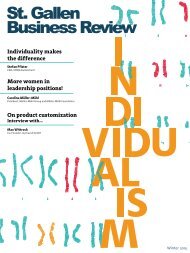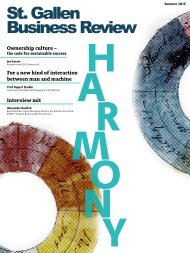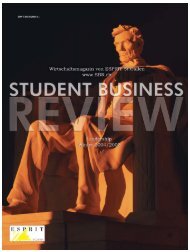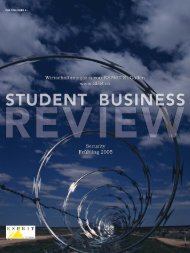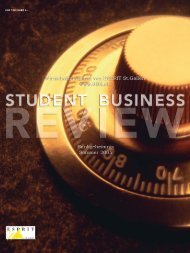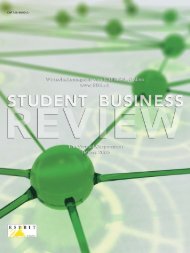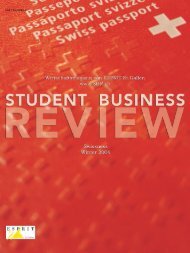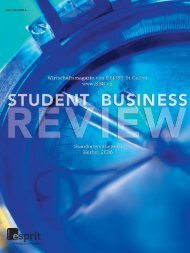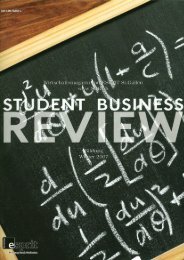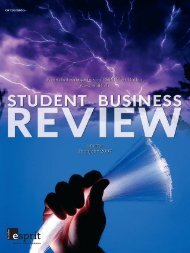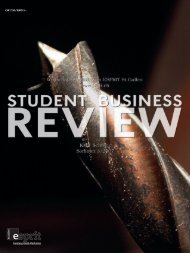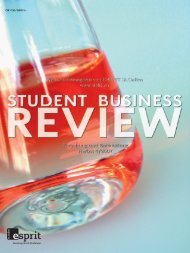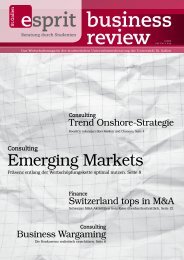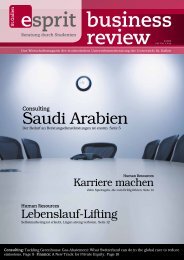Sicherheit und Risiko
St.Gallen Business Review Winter 2012
St.Gallen Business Review
Winter 2012
Erfolgreiche ePaper selbst erstellen
Machen Sie aus Ihren PDF Publikationen ein blätterbares Flipbook mit unserer einzigartigen Google optimierten e-Paper Software.
ESPRIT St.Gallen Business Review<br />
«Although the European<br />
Union is facing a<br />
f<strong>und</strong>amental crisis, it<br />
is urgently needed as<br />
an internationally reliable<br />
and strong<br />
actor that speaks with<br />
one voice.»<br />
G20, which are also reflecting on the redistribution of<br />
global weights.<br />
Because our resources – including our security<br />
resources – are limited, we must forge close networks<br />
– including security networks. This offers unexploited<br />
potential – across regional, indeed continental bo<strong>und</strong>aries.<br />
We need to intensify our partnerships. China, Brasil,<br />
India, Indonesia – just to name a few - will become<br />
more important for Europe after all. I believe that we<br />
should expand the existing strategic partnerships. Interantional<br />
security policy is an obvious field. It is one<br />
in which the interests of Europe and, say, even China<br />
are often closer than many people think.<br />
There is a saying that forecasts are difficult to make<br />
– particularly when the future is concerned. However,<br />
when we look at tomorrow’s world, I think we can assume<br />
that certain lines of development, at least certain<br />
trends are relatively likely.<br />
«I believe that we<br />
should expand the<br />
existing strategic<br />
partnerships.»<br />
First, the trend towards heterogeneity in the international<br />
order will continue. This heterogeneity will<br />
encompass both state and non-state actors. And in<br />
addition to states, it will feature regional actors with<br />
regional ambitions more. This means that we will face<br />
increasingly demanding challenges in our international<br />
policy. Reconciling interests will not be easier. At the<br />
same time – what a platitude - we live in one world. And<br />
in one world it is important that we are aware of the<br />
consequences of national policy as well as what signals<br />
we send to our neighbours and partners.<br />
Secondly, globalization will further increase in intensity.<br />
The financial crisis has shown us how fragile<br />
international orders can be today. Whilst we will on the<br />
whole benefit more from globalization than suffer due<br />
to its negative effects, the risks associated with the rise<br />
in global interdependence will be quite real.<br />
A third trend is that the need for cooperation – across<br />
regional and continental bo<strong>und</strong>aries – will increase<br />
for the very reason that the new risks will be hard to<br />
calculate. When challenges cannot be stopped at borders,<br />
states will be even less in a position to solve the<br />
attendant problems on their own than they are today.<br />
The effort to establish an international order within<br />
which the dignity of man and f<strong>und</strong>amental human<br />
rights are observed and the rule of law is ensured has to<br />
unite us all - domestically and internationally.<br />
As the world population grows and is likely to rise<br />
to more than 9 billion by 2050, we are forced to find<br />
answers to all of these challenges.<br />
About the Author<br />
Karl-Theodor zu Guttenberg<br />
served as German Federal<br />
Minister of Defense<br />
from 2009 to 2011 and as<br />
Federal Minister of Economics<br />
and Technology from<br />
February 2009 to October<br />
2009. As a “Distinguished<br />
Statesman” at the Center for Strategic and International<br />
Studies (CSIS) in Washington, DC, Mr. zu<br />
Guttenberg leads a new high-level transatlantic dialogue<br />
initiative focused on global trends and current<br />
political, economic, financial, as well as technology<br />
issues. Since December 2011, Karl-Theodor<br />
zu Guttenberg serves as Senior Advisor to the European<br />
Commission’s “No Disconnect Strategy”,<br />
providing strategic counsel on how to give ongoing<br />
support to internet users, bloggers and cyber-activists<br />
living <strong>und</strong>er authoritarian regimes.<br />
Mr. zu Guttenberg, who holds a law degree from<br />
the University of Bayreuth, was in the private sector<br />
prior to entering German politics in 2002. He<br />
currently lives with his wife and two daughters in<br />
Greenwich, CT.<br />
12<br />
Winter 2012




